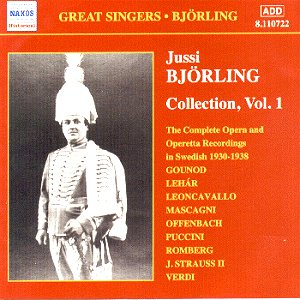


BUY NOW
Charles GOUNOD (1818-1893)
Roméo et Juliette; Ah leve-toi soleil!
Giuseppe VERDI (1813-1901)
Rigoletto; Questa o quella
Rigoletto; La donna e mobile
Il Trovatore; Di quella pira
Raoul LAPARRA (1876-1943)
L’illustre Fregona; Melancolique tombe le soir
Alexander BORODIN (1833-1887)
Prince Igor; Daylight is fading
Giacomo PUCCINI (1858-1924)
Tosca; Recondita armonia
Tosca; E lucevan le stelle
La fanciulla del West; Ch’ella mi creda libera
Ruggiero LEONCAVALLO (1858-1919)
Pagliacci; Recitar! Vesti la giubba
Pietro MASCAGNI (1863-1945)
Cavalleria rusticana; O Lola
Kurt ATTERBERG (1887-1974)
Fanal; I manner over lag och ratt
Victor HERBERT (1859-1924)
Naughty Marietta; Ah! Sweet Mystery of Life
Imre KÁLMÁN (1882-1953)
Das Veilchen von Montmartre; Du gar som en liten prinsessa; Heut’ Nacht hab’ ich getraumt von dir
Sigmund ROMBERG (1887-1951)
The Desert Song; My Desert is Waiting
Franz LEHÁR (1870-1948)
Das Land das Lachelns; Dein ist mein ganzes Herz; Von Apfelbluten einen Kranz
Paul ABRAHAM (1892-1960)
Die Blume von Hawaii; Du traumschöne Perle; Kann nicht küssen ohne liebe
Johann STRAUSS (1825-1899)
Der Zigeunerbaron; Wer uns getraumt
Carl MILLÖCKER (1842-1899)
Der Bettelstudent; Ich hab kein Geld; Soll ich redden…Ich setz den Fall
Jacques OFFENBACH (1819-1880)
La Belle Helene; Au mont Ida trois déesses
Hjördis Schymberg (soprano) in Strauss and Millöcker’s Soll ich redden
Nils Grevillius and his Orchestra except
Hanns Binngang and his Orchestra in Du gar som en liten prinsessa; My Desert is Waiting and
Jens Warny and his Orchestra in Heut’ Nacht hab’ ich getraumt von dir